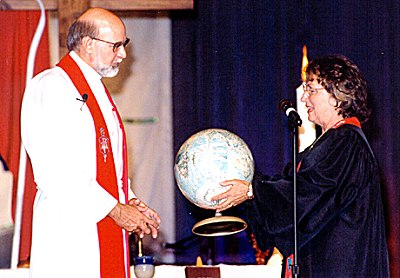General Board of Global Ministries
![]()
UM Information
UM
Reporter
![]()
Florida Southern College
![]()
Bethune
Cookman College
![]()
FL UM Children's Home
![]()
|
|
Bishop challenges conference to be apostolic |
 |
Photo by Geoff Anderson |
| The Dare to Share Jesus 2001 Florida Annual
Conference event May 29 - June 1 marked the official beginning of Bishop Tim Whitaker's
ministry in Florida. At a special installation service the first evening of the conference event, Whitaker received different items representing his episcopal ministry, including a globe for world missions from the Rev. Linda Standifer, chairwoman of the conference's Missions ministry team. |
By Michael Wacht LAKELAND — Bishop Timothy W. Whitaker challenged the people of the Florida Conference to recover the spirit and the power of Jesus’ apostles as they shared the gospel in a skeptical and sometimes hostile world. Whitaker’s challenge was the theme of his first sermon to the annual conference, delivered during his installation service the first night of the Dare to Share Jesus 2001 Florida Annual Conference Event here. Whitaker was elected bishop Feb. 27 at a special session of the Southeastern Jurisdiction and appointed to the Florida Conference the same day. He began serving the conference April 2. The May 29 worship and communion service also served as the opening celebration for the conference’s annual event. More than 2,000 Florida Conference clergy and laity attended the service. Whitaker began his sermon by reading from his favorite scripture passage, Acts 3:1-10, in which Peter and John heal a lame man outside the temple. He said that act by the two apostles was the beginning of the Apostolic Age, the most difficult and exciting time in the history of the church. “It was the most difficult age of the church, because the apostles encountered a world that knew nothing of Jesus Christ…they encountered indifference and hostility,” he said. “It was the most exciting because they were sharing the gospel with the whole world. They were filled with the joy of the memory of the resurrection of Jesus Christ and the power of the outpouring of the Holy Spirit at Pentecost.” Calling today’s age a post-Christian era, Whitaker said modern churches need to learn to live as alternative institutions in a time that is as exciting and difficult as the time of Jesus’ apostles. “It’s difficult because we’re facing a world in which many people know nothing at all about Jesus Christ,” he said. “It’s exciting because it challenges us to be apostolic once again…and to learn to reach out to others with the good news of Jesus Christ.” That good news, Whitaker said, should not be what people ask for, but what people need. Just as John and Peter gave the lame man healing, instead of the money he asked for, the church should not base itself on the “natural desires” of people. He said the church should not offer people self-esteem, but divine acceptance, not social contact, but a loving and accepting community of faith, and not a dulling of Christianity, but a Christian critique of the culture. Whitaker challenged the church to use the vocabulary of Christianity. “Is grace that much more difficult to understand than self-esteem?” he said. “Is idolatry that much more difficult to understand than co-dependency?” As the church uses Christian language Whitaker said it must also make sure its actions match the language. Christians must believe in Jesus, be baptized into the faith, confess and repent of their sins, worship the one, true, living God and “seek to love God and our neighbors in all we do everyday,” he said. The lame man healed by Peter and John was also symbolic of the nation of Israel, which had become nationalistic and exclusionary and needed to know that its savior had come, according to Whitaker. “The lame man is us,” he said. “We are being summoned to stand up and take the message of Jesus Christ…who brings healing to our lives and to the world.” Whitaker said he was learning a lot about Florida, including how to pronounce some names unique to the state, such as Tallahassee, Apalachicola and Okeechobee. He also said he has a lot to learn about his new conference. “One thing I do know about Florida is that it is a mission field…if we are willing to be a church in apostolic mission,” he said. During the service Whitaker was presented with the signs of episcopal ministry, including the staff representing his pastoral duties, a Bible representing the primacy of scripture, water representing baptism, bread and cup representing oneness with Christ, a towel and basin representing servant ministry, a stole representing ordained leadership, a globe representing world missions, a Book of Discipline representing obedience to the church and a gavel representing governing duties. After the service, many of the laity and clergy attended a reception for the bishop and his wife, Melba. Top
of this page |
